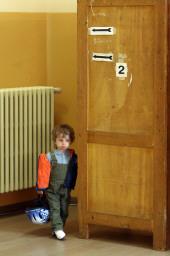Italians went to the polls on Sunday in the first of two days of voting which could put media tycoon Silvio Berlusconi back in the saddle.
The two-time premier's main adversary is Walter Veltroni, a former Rome mayor who has cast himself as Italy's Barack Obama.
Both Berlusconi, 71, and Veltroni, 52, are promising to pull Italy out of the economic doldrums with tax and public spending cuts and more infrastructure investment while improving the lot of the poorest workers and pensioners.
But the mood outside polling booths was less than hopeful with many voters despairing not only over the state of the economy but the political class in general.
Up to 30 million voters, or a third of the electorate, were still estimated to be undecided.
One voter in Sorrento near Naples symbolised the widespread discontent when he ate his ballot slip in protest.
Businessman Ciro D'Esposito munched his way through the ballot paper saying ''they all make me sick, none of them represent me. Politics is poisoning the country''.
D'Esposito was unrepentant after being taken away and charged with destroying his ballot - a crime which carries one-to-six years - telling reporters: ''I know this will cause me trouble but it was important to protest. I'm so fed up - what future is there for our kids?''
TOUGH TIMES AHEAD.
Italy is teetering on the brink of recession, with GDP growth put at only 0.3% this year by the International Monetary Fund.
Strapped by the third biggest debt mountain in the world, the country is lagging behind its euro-zone partners.
Consumer spending has fallen as Italians struggle with some of the lowest wages in Europe and a hike in inflation which has included food prices.
The near-bankruptcy of Italian flag carrier Alitalia, an ongoing trash crisis in Naples and a scare over dioxin-tainted mozzarella have also knocked morale.
Added to the gloom is the fear that neither opinion poll-leader Berlusconi nor ex-Communist Veltroni will muster a sufficiently strong parliamentary majority for hard-hitting reforms.
Italy's electoral law, which returned the country to proportional representation and was pushed through by the previous Berlusconi government only months before the 2006 election, could make it difficult for any party to win a decisive hold over the Senate.
Unlike the House, Senate seats are assigned according to regional performances, a feature which can work in the favour of smaller parties with strong regional bases.
The system left outgoing Premier Romano Prodi, whose government collapsed in January after 20 months in power, with a comfortable House majority but only a fatal two-seat lead in the Senate.
Political observers fear the next government could be similarly handicapped.
Berlusconi, who a fortnight ago was 5-9 points ahead in the polls of Veltroni (the law bans the release of opinion polls in the last two weeks of an election), spent his last moments of campaigning on Friday stressing the importance of the 'voto utile' (useful vote).
He urged centre-right voters not to ''waste'' their votes on minor players but pick his People of Freedom party (PDL) to give him the biggest majority possible.
Berlusconi made history with his last government by becoming the only premier since the end of the war to last a full five-year term.
But even the ever-optimistic Berlusconi has had to admit that whoever takes over the reins this time has a tough task ahead.
His election manifesto states that ''we do not carry out or promise miracles'' and warns that Italy is in the midst of an economic crisis which could get worse.
Berlusconi has portrayed himself as the only politician with the sufficient experience and popular support to steer Italy through difficult times.
Veltroni, meanwhile, has sought to strike home a message of change and renewal, adopting US presidential hopeful Obama's ''Yes we can'' catchphrase.
The endorsement of Hollywood star George Clooney, Italian director Roberto Benigni and Roma soccer ace Francesco Totti added sparkle to Veltroni's closing campaign but Berlusconi added punch to his with a last-second promise to abolish automobile and scooter taxes.
Political observers have argued that a close vote could force Berlusconi and Veltroni to either seek the help of former allies or work together in a ''Grand Coalition''-style government that would carry out electoral reform before calling fresh elections.
The risk in the meantime would be an increasing vision of Italy's political class as an inward-looking, self-absorbed ''caste'' unable or unwilling to tackle the country's real problems.
Top independent socioeconomic think-tank Eurispes recently summed up the malaise saying that Italian society and its political class resembled ''a separated couple living under the same roof''.













